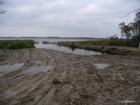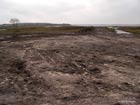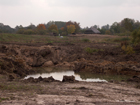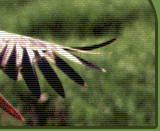Human and nature in confrontation What is the benefit for us from animals and plants which someone is striving to protect? What benefit a negligible meadow animal is capable to give for a person living in Dunalka, Durbe or Liepāja?  | | Destroyed floodplains | | at Durbe Lake | Human and nature in confrontation What is the benefit for us from animals and plants which someone is striving to protect? What benefit a negligible meadow animal is capable to give for a person living in Dunalka, Durbe or Liepāja? These questions can be answered with words by Gerald Darrel and one of his works (book The Overcrowded Ark): We have no moral rights to destroy species whose evolution took millions of years and who have the same rights to leave on this planet as we do. In fact, they have stronger rights, because they had never tried to overstep the borders marked by nature and in most cases theses species gives something good for the place the live in (..). One of the unique nature territories where human and nature have cohabited successfully for centuries is located by Durbe. Although the drainages from the times of collective farms (kolkhoz) have destroyed the natural flow of river Lāņupe and the floodplains containing ditches during flood time in spring are not overflown anymore in such areas as before, though there are many distinguished nature values. The restricted nature area is located within the territory of three local municipalities: Durbe region, Dunalka parish and a little part of Vecpils parish. This restricted nature area is established in year 2004 and a year after establishing it was included in the list of protected nature areas of European importance - Natura 2000. The amount of protected species can be measured by several tens and even in the amount of birds corncrakes, migrating geese and the Northern Swan could be emphasized. Every year there is a large amount of wading birds noticed in this territory. Lake Durbe meadows are in the range of the places left in Kurzeme as a nesting ground for snipes which currently are already extinct in the territory of West Latvia, though there is a hope that after meadow restoration activities these birds will return in this site. However, in some cases private initiatives flatly ignores the observation of legal regulations, and their conduct is condemnable. Currently, in Liepāja Regional Environmental Board there are at least four cases submitted for the consideration about the breach of law in the restricted nature  | | There was natural grassland | | with EU importance | area and connected with illegal development of harbour halts and beaches, as well as earthworks even with bulldozer in wider areas. The guilty parties will be punished and also in future any illegitimacy will be considered in the lawful procedure. Even more significant is the question about the public attitude in similar cases. Do we as a society really support all good things and agree with this position, but separately as individuals will act completely contrary to any public interests? Does everything should be measured in money, or hectares not reclaimed yet or vacant square metres for construction? Why this should happen at the expense of endangered natural values and at any price? In future our children and grandchildren will definitely blame many our activities and consider them to be wrong. But what is the benefit if continuing acting the way we do already after some generations the major part of diversity of wildlife in Latvia will be extinct or preserved only in separate protected nature areas that would be exactly the same as the Latvian folksongs formerly singed in all regions are placed in one little Bookcase of Latvian folksongs
It is wrong to consider that restricted nature reserve means prohibition of any economic activity. Even otherwise in order to preserve the floodplain meadows and species living in these sites, it is necessary to clean this overgrown territory from bushes and regularly cut the grass in meadows or pasture them. Pretty large payment could be received for this conduct, which is even a certain privilege compared to other meadow landowners in Latvia. Managing such meadows of great nature value is a significant mission for conservation of nature diversity that is already supported by funding from the European societies. Consequently, the main product developed by Lake Durbe meadows is not milk, meat or tons of hay, but the protected floodplains, diversity of species and scenery in favour of the interests of our next generations. Further on, it is planned that the territories of Natura 2000 will be of larger priorities in relation to conservation of nature diversity in the European Union which will be an opportunity to attract supplementary funding both for implementation of habitat restoration (which is happening also currently by implementation of the LIFE-Nature project Restoration of Floodplains in Lake Durbe Meadows), and for the events needed for ensuring nature conservation and ecotourism activities which is not in conflict with conservation of nature values. We should be proud of all these natural resources and the wealth of nature values we have, and set our energy to benefit from the opportunities provided by the status of Natura 2000. Still at the end of December, the public discussion of nature conservation plan of Lake Durbe Meadows is planned. All the interested parties of possibly wide range of interests are welcomed to participate in this discussion! 
Andris Klepers |







